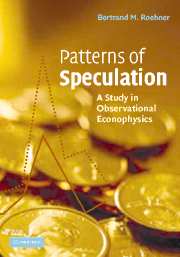1 - WHY ECONOPHYSICS?
Published online by Cambridge University Press: 02 December 2009
Summary
Johann Gregor Mendel was born in Hyncice, in what is now the Czech Republic, on July 22, 1822. After studying science at Vienna (1851–1853), he became Abbot at Brno (1868). The question of how traits were passed fromone generation to the next was at that time extensively investigated by several scientists, but with fairly inconclusive results. Unlike others Mendel studied only one trait at a time and he studied several generations instead of just two or three. He also managed to set apart accidental factors, such as the influence of foreign pollen. It is estimated that in the course of his investigation he observed about 28,000 peas, a figure which attests to the thoroughness of his investigation. He also devoted much time to meteorological observations; in addition to his two celebrated papers on hybridization he wrote nine articles on meteorological questions. This part of his activity is less well known because it did not lead to path-breaking discoveries, but it is interesting to observe that it continued a well-established tradition. Before himse veral other great scientists, such as Kepler (1571–1630), Descartes (1596–1650), or Lavoisier (1743–1794), had devoted a substantial part of their scientific activity to meteorological studies, without, however, being able to make significant inroads. This short account of Mendel's accomplishments encapsulates several of the themes that we develop in this chapter, such as the emphasis on thorough and systematic experimental work or the classification of scientific problems according to their degree of complexity.
As one knows the term econophysics designates the investigation of economic problems by physicists.
- Type
- Chapter
- Information
- Patterns of SpeculationA Study in Observational Econophysics, pp. 3 - 24Publisher: Cambridge University PressPrint publication year: 2002
- 1
- Cited by



